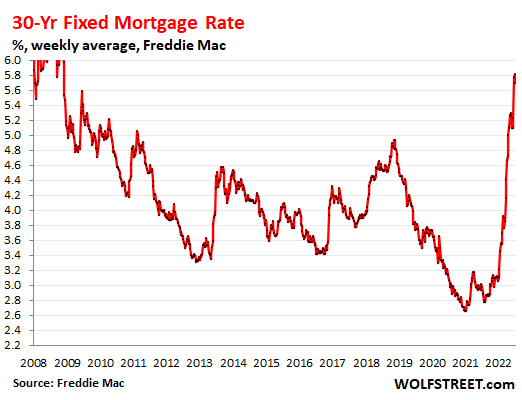New, cold reality may be in store for hosts of short-term Airbnb rentals

In what some described as a “gold rush,” some investors bought short-term rentals during the pandemic to take advantage of historically low mortgage rates and a surge in demand from remote workers who could work from anywhere.
The enthusiasm for short-term rentals — on full display on TikTok and other social media in recent years — tapped into the growing popularity of platforms like Airbnb Inc. (NASDAQ: ABNB) and Expedia Group Inc.’s (NASDAQ: EXPE) Vrbo that allow investors to more easily compete with hotels in offering accommodations. Such marketplaces for short-term rentals is a relatively new phenomenon, so their impact on the next housing market downturn is a big unknown.
“Over the last three years in the world of real estate investing, short-term rentals have been sort of a gold rush,” Tony Robinson, co-host of the Real Estate Rookie podcast, told NerdWallet last month. “I think a lot of people who jumped in looking to make a quick buck will back out.”
Bay Area residents often choose to invest elsewhere, often putting money to work in lower-cost housing markets that offer better prospects of positive cash flow every month. That often meant investors’ dollars, and possibly even themselves, landed in fast-growing cities such as Austin, Dallas and Boise. These and other destination cities are seeing home prices fall sharply from their prepandemic peaks even as owners complain that making money on their short-term rentals isn’t as easy as they had hoped.
Owners of short-term rentals may be already looking for the exits.
“In Boise, we’ve already seen some of that turnaround,” said Lisa Kohl, a real estate agent with We Know Boise Real Estate, an affiliate of Keller Williams. “We’ve already seen some of that inventory start to hit and frankly, it’s been welcomed. It usually gets absorbed when you’re sitting at about two months of inventory.”
In addition to Boise’s tight for-sale housing market, investors can convert their short-term rentals into traditional rentals, although that often doesn’t bring in the revenue that renting short term has in recent years.
But concern is rising that rents on traditional rentals could fall in the months ahead, as noted in recent research by the Federal Reserve Bank of San Francisco, which stated that rents could start decreasing by mid-2024.
So why are some owners of short-term rentals looking to sell?
“People probably aren’t running their numbers the way that they should be,” Kohl said, adding that Airbnb rentals may have appeared to be an easy way to become a real estate investor. “And then if the vacancies are down, because there are too many Airbnbs in a certain neighborhood or things like that, obviously that impacts people’s cash flow, and then it no longer makes sense.”
Airbnb CEO Brian Chesky this month urged Airbnb hosts to lower their prices.
“We want prices to move and to be more competitive vis-å-vis hotels — that is really important,” Chesky recently told Business Insider, which cited fears of an “airbnbust” plaguing the company since last year, with hosts complaining of a bookings slowdown, increased competition for guests and falling revenue.
A viral flashpoint in the “airbnbust” debate occurred earlier this year when Nick Gerli of Reventure Consulting posted on X that “the Airbnb collapse is real.” He cited one study that found Airbnb hosts had experienced a collapse in revenue of more than 40%. But analytics firm AirDNA, using a larger sample, found that the average revenue per available rental was closer to 3%.
Some of the difficult math for owners of short-term rentals may have required a crystal ball to anticipate soaring home insurance premiums that the Wall Street Journal found is even spurring some homeowners to sell. Then again, some investors may have overestimated what their properties would rent for on Airbnb and similar services, especially amid signs of the postpandemic travel surge cooling.
It’s a new, cold reality for those who may have been too enthusiastic for short-term rentals.
Amid the pandemic’s historically low interest rates and easy money, borrowers could load up on debt to buy multiple properties. A popular loan among investors — and the YouTubers touting them — are so-called debt service coverage ratio mortgages that are underwritten based on the revenue a rental property generates, not the borrower’s income. One lender pitching DSCR loans Thursday touted that such loans require no tax returns or W-2s. Instead, borrowers are advised on the lender’s website to have a “decent” payment history: at least a 660 credit score and a 15% downpayment. That’s just one lending promoting a DSCR loan offering, but such loose lending causes a concern on how prepared these borrowers are for the next recession.
More sobering times may be ahead as a confluence of factors raise cautionary flags. Companies that once embraced remote work now want employees to report to the office at least part of the week.
Plus, rising interest rates could threaten the health of the housing market. Interest rates moved closer to 8% this week, with the 30-year mortgage rate averaging 7.79%, Freddie Mac said Thursday. A week ago, such mortgages averaged 7.63%. Wells Fargo economists warned clients Thursday: “Rising borrowing costs stand to tip the housing sector into recession.”
That would be bad news for owners of short-term rentals eager to unload their properties that aren’t generating enough money every month to cover the mortgage payment and other costs. But these investors may try to hold on in some fashion if they’re holding mortgages with relatively low rates.
The rules of the game are also changing on Airbnb hosts in New York, Dallas and other cities adopting restrictions on short-term rentals.
Airbnb and others downplay such talk.
“Frequently booked listings, those rented for 90 or more nights a year, make up a minuscule portion of the vast majority of U.S. cities’ housing stock,” said Taylor Marr, senior housing economist for Airbnb. “The mortgage lock-in effects, caused by high interest rates, which are expected to persist, would also limit any potential impact on the U.S. housing market.
“Additionally, the Airbnb marketplace is healthy, with supply and demand generally growing in tandem,” Marr said.
Others also criticize those calling for what some call an “Airbnbust.”
“The Airbnbust narrative goes something like this: a surplus of Airbnb hosts enters the rental market, leading to a small piece of the pie for existing hosts and lower potential earnings,” AirDNA posted in a blog this month. “Falling revenues translate into missed mortgage payments, triggering mass property sales and plummeting home prices across the U.S.
“So-called ‘housing doomers’ argue that this nightmarish scenario is unfolding before our very eyes.”
| Rank | Prior Rank | Person |
|---|---|---|
|
1 |
1 |
Pichai, Sundar |
|
2 |
3 |
Cook, Tim D. |
|
3 |
3 |
Thygesen, Allan |


